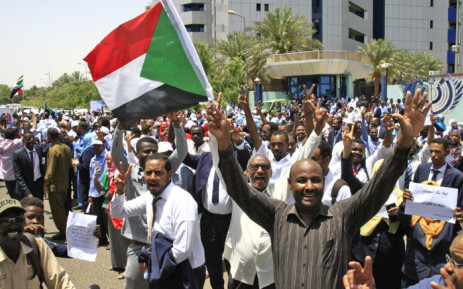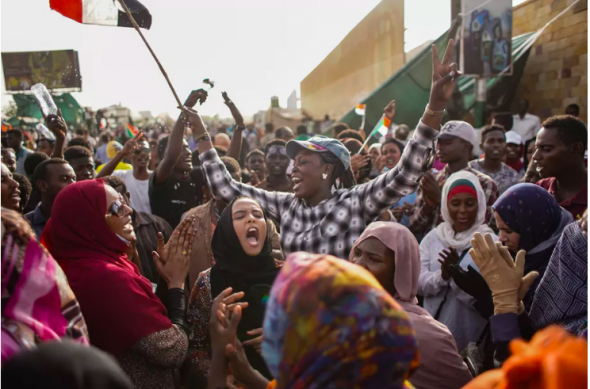loyola llothta
☭☭☭

15 August 2019
Sudan’s “Constitutional Declaration” Leaves Out Key Political Forces. Attempted Military Coups and Regional Intrigue
Factions within military accused of attempted coups while reports of purge of “Islamists” continue
By Abayomi Azikiwe
Members of the Sudanese Professional Association (SPA), a leading organization within the Forces for Freedom and Change (FFC), announced on August 9 that they would have no representatives in the soon to be created transitional government.
This report comes in the midst of a whirlwind of political developments inside the oil-producing African state which has experienced social unrest, a military coup and ongoing negotiations aimed at establishing an effective interim process.
Former President Omer Hassan al-Bashir of the National Congress Party (NCP) was ousted in a putsch on April 11, just five days after the commencement of a sit-in outside the defense headquarters in the capital of Khartoum. The occupation remained until it was violently dispersed nearly two months later at the aegis of the Rapid Support Forces (RSF), an important component of the security apparatus in the country.
Demonstrations began in Sudan during mid-December as a rise in bread prices triggered thousands of people to move into the streets in protest. Soon enough the demands shifted from economic grievances to the call for the resignation of President al-Bashir.
A Political Declaration agreed to by the FFC and the Transitional Military Council (TMC) which has ruled the nation since April 11, laid a framework for a Sovereign Council where representatives from both the TMC and FFC will share power for 39 months leading up to multi-party elections. The terms of the implementation of the Constitutional component of the three-pronged transitional framework will remain uncertain particularly with the absence of a pathway towards peace which is contingent upon its adoption by the armed opposition groupings, the Left and other disaffected tendencies.
However, the armed Sudanese Revolutionary Front (SRF) and the Sudanese Communist Party (SCP) have already expressed their displeasure with the terms of the Political Declaration leaving the possibility of continuing demonstrations and other forms of resistance. This same position has carried over as it relates to the Constitutional Declaration agreement as well. The third component of the transitional arrangement, the Legislative Council, is yet to be determined by the principal negotiators of the FFC and the TMC.

Sudanese celebrate the signing of the Constitutional Declaration on August 9, 2019 (Photo by EWN)
Other groups which have significant followings, the National Umma Party and the Sudanese Congress Party (SCP) have also revealed they will not be a part of the transitional government based in Khartoum. An apparent restless populace which has been the target of highly repressive measures by the security forces may not be willing to remain optimistic in light of a myriad of unanswered questions related to the country’s future.
SRF affiliates have been engaged in military operations against the central government for many years. Two of the principal members of the alliance are fighting against SAF and RSF units in South Kordofan, Blue Nile and the Darfur region.
Consequently, when the SPA said it would not participate in the transitional government, additional questions came to the fore. Moreover, how long will the negotiations continue on outstanding issues related to the Political Declaration and the Constitutional Declaration? A Legislative Council is also under discussion which would theoretically seal a pathway towards a new dispensation.
In an article published by Sudan Tribuneon August 9, it says that:
“The Sudanese Professionals’ Association and the opposition Unionist Gathering have announced that they will not participate in the transitional government due to be formed in late August. The two groups were the spearhead of the protest movement that lasted for months before to topple the regime of Omer al-Bashir in April 2019.”
This same above-mentioned dispatch goes on to note:
“Babikir Faisal the Chairman of the Unionist Gathering’s Executive Committee told reporters on Wednesday (Aug. 7) that they would not take part in the upcoming government. ’The Gathering will not participate in the transitional government,’ Babikir told a news conference on Wednesday. He stressed that there are no quotas in the transitional government and that what is circulating through the media are ‘mere rumors.’”
Therefore, despite the extensive discussions between the FFC and TMC in both Khartoum and in Addis Ababa, Ethiopia, under the mediation of the African Union (AU), existing contentious issues are unresolved. There can be no effective transition to even a bourgeois democratic government without securing sustainable peace treaties mandating the laying down of arms and the creation of an inclusive administration.
Attempted Military Coups and Regional Intrigue
Another key element of the Sudanese political crises is the numerous accounts of attempted counter-coups within the SAF itself. Several high-ranking military officials have been arrested where they join former President al-Bashir in detention.
In addition, there were rumors of ongoing “purges of Islamists” military personnel from the SAF. Defining what the term “Islamists” actually means within the context of contemporary Sudan is undoubtedly complex. The previous government of the NCP under al-Bashir was categorized by some as “Islamist.”
At the same time there are other political tendencies such as the Umma Party and the Popular Congress Party (PCP), long in opposition to the NCP, as also fitting into this characterization. These factors raise the question as to the nature of the political disagreements obviously plaguing the military apparatus.
For example, the crackdown on the mass demonstrations which occurred in the capital of Khartoum on June 3 has been attributed to the RSF. In a sense the SAF has attempted to distance itself from some of the harsher forms of repression which have resulted in the deaths of more than 300 people.
On the international level, there are reports that the RSF militias are supplying weapons to opposition forces in the Central African Republic (CAR). The Seleka Coalition, an alliance of several organizations dominated by the CAR’s minority Muslim population, has recently signed a peace deal with the government in the capital of Bangui.
Seleka Coalition affiliates are said to be concerned about a possible offensive to disarm their forces. This comes amid the increasing presence of advisors from the Russian Federation who were requested to assist the military of the CAR by its current President Faustin-Archange Touadera. The appeal was made directly to Russian President Vladimir Putin on the sidelines of the United Nations General Assembly in 2017.
Moreover, SAF units are still cooperating with Saudi Arabia and other regional states in the now more than four-year old war being wage in Yemen. This is a United States engineered bombing and ground campaign designed to weaken the Ansurallah (Houthis) Movement. The U.S., Britain and their allies contend that the Ansurrallah are backed by the Islamic Republic of Iran and therefore viewed as a threat to the strategic balance of forces in the Middle East.
The Aims of Imperialism in Sudan
Washington’s foreign policy towards Sudan has been geared towards regime-change and a total capturing of the state for the purpose ensuring compliance with its political and economic objectives in North and Central Africa. The fact that the previous government of President al-Bashir had exercised a degree of independence from successive U.S. administrations, both Democratic and Republican, resulted in hostile actions towards the NCP over a number of years.
The al-Bashir government had made firm economic agreements with the People’s Republic of China in regard to its drilling and export of oil. Ousted President al-Bahir also defied the warrants issued against him by the International Criminal Court (ICC), saying that they would not recognize this imperialist construct as having any authority over the country and its leaders.
Nevertheless, this modicum of independent domestic and international policy would shift after 2014 with the decline in petroleum prices and the worsening economic outlook for the Republic of Sudan in the aftermath of the partitioning of the South. The Republic of South Sudan came into being in 2011 largely as a result of the contradictions which developed during the period of British colonialism in the late 19th and early-to-mid 20th centuries until the country became liberated in 1956.
Britain ruled Sudan as two separate entities involving the North and the South. These divisions fomented two civil wars, from 1955-1972, and later from 1983 through 2003. The transition to partition reduced the economic and territorial status of the Republic of Sudan, which prior to the independence of Juba, was the largest geographic nation-state in Africa.
The U.S., Britain and the State of Israel supported the creation of the Republic of South Sudan. As events have developed since 2013, the Republic of South Sudan has not proven to be a viable state and has been inflicted with civil war due to a split within the ruling Sudan People’s Liberation Movement/Army (SPLM/A). Both Juba and Khartoum are suffering from internal conflict and economic malaise. Consequently, the imperialist legacy of domination has effectively impeded the genuine development of the now two separate states.
Of course this contemporary history has profound significance for other regional states and Africa as a whole. The necessity for the resolution of internal conflict and the maintenance of sovereignty is the major question facing the AU. The degree to which the Republic of Sudan can resolve its present situation will prove instructive to other African and developing nations.
Sudan's "Constitutional Declaration" Leaves Out Key Political Forces. Attempted Military Coups and Regional Intrigue - Global Research






